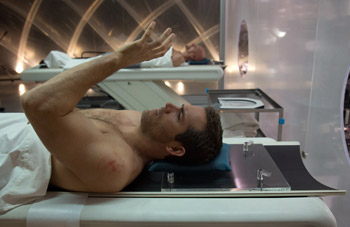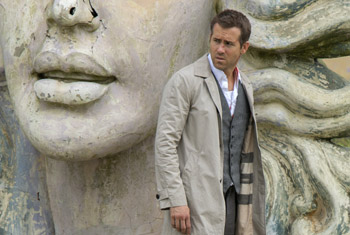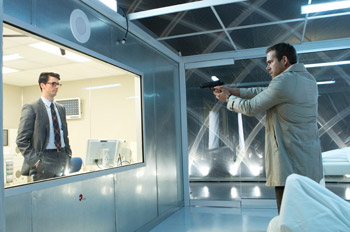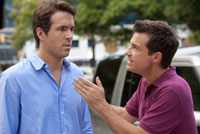Ryan Reynolds Self/less

Ryan Reynolds Self/less
Cast: Ryan Reynolds, Ben Kingsley, Matthew Goode
Director: Tarsem Singh
Genre: Drama, Sci-Fi, Thriller
Rated: PG
Running Time: 117 minutes
Synopsis: If only I had more time to live my life...We all think it and we all feel it. But what if you were able to take that time – for a price? In the provocative psychological science fiction thriller Self/less, director Tarsem Singh explores the consequences of taking a life to live forever.
Billionaire industrialist Damian Hale (Academy Award winner Ben Kingsley) has long been a master of his universe, excelling at power plays from his NYC base of operations. Estranged from his activist daughter Claire (Michelle Dockery of Downton Abbey), Damian's only real connection is with his lifelong friend and right-hand man Martin O'Neil (Victor Garber). But a dire cancer diagnosis makes Damian determined to access a radical medical procedure, 'shedding," that will turn back the clock for him.
The process is offered to Damian by Albright (Matthew Goode of The Good Wife), the brilliant head of a secret organization that caters to the wealthy. Damian seizes the opportunity, and his death is staged. The world now thinks he is gone, but he is in fact 'shedding:" his consciousness is being transferred into the body of a healthy man (Ryan Reynolds) decades younger than he. The operation is deemed a success.
Adapting to his new physical form and beginning a second life in New Orleans, Damian is befriended by a local man, Anton (Derek Luke). Both preserving his newfound health and indulging himself, Damian becomes comfortable in his new identity as 'Edward." But the disturbing images flooding his consciousness are not easily explained away by Albright's contention that 'immortality has some side effects."
When he finds himself drawn to single mother Madeline (Natalie Martinez), Damian starts to uncover the mystery of 'Edward's" origin – and those who will kill to protect the organization. Summoning two lifetimes' worth of strength and resourcefulness, Damian fights for his life and for the lives that he has impacted.
Self/less
Release Date: July 23rd, 2015
About the Production
As screenwriters, brothers David and Alex Pastor find that their creative process can be motivated by what keeps them awake at night. 'I feel that everybody can relate to -I wish I had more time,'" says David Pastor. 'We wanted to write about a powerful character who has everything but whose body is failing him and who then finds that his money might be able to buy him a new life. And although the key to this new life is a revolutionary new technology, we decided we would not get bogged down in technicalities and would keep our story as more of a fable than anything else. It was the moral consequences that interested us."
Alex Pastor remembers, 'The more we discussed this, the more I was excited about the way someone could -buy time,' since sometimes people who have more money can get away with things that the rest of us mortals can't. The science fiction that David Pastor and I like to write explores moral and ethical issues; for Self/less, we looked at the fantasy that technology could free us from our own death, and what the non-monetary price paid would be. These ideas tied in to universal themes."
David Pastor notes, 'Death is something we all have in common; it's the big question mark at the end of the road we share. Are we ever ready for that?"
Alex Pastor responds, 'I don't think we ever are ready to die because it's in our genes to fight for survival, to keep moving, and to keep living as long as we can."
Posing moral questions and addressing issues of mortality have long been defining characteristics of notable science fiction stories. The Pastor brothers' resulting script attracted industry attention by making the Black List of best unproduced screenplays.
One of the movies' premier fantasists, director Tarsem Singh, was looking to train his eye on 'something that was less fantastical." As such, he found the Pastors' script to be '20 minutes into the future, so I didn't even see it as sci-fi, really. But it definitely was a thriller, with action, and I had been looking for all that to do in a movie."
Regarding mortality, Tarsem Singh asks, 'Would any of us want to live forever with an aging body, holding a catheter, or would we want another option? With everything that you can buy now on the black market – a harvested liver and much more – that discussion is going to happen.
'Our minds can live a lot longer than what our physical bodies have evolved to live, but what can we do about that? Had Einstein or Steve Jobs lived a little longer, they could have done a lot more for humanity."
Producer Ram Bergman notes, 'When I got the script, I felt that it was a concept to which most people could relate; it's grounded in reality even with the sci-fi element. So here was a movie that would work within the thriller genre yet at the same time raise questions. There is a true arc to this story.
'I called Jim Stern because we had produced Looper together and I felt this was a similarly provocative and exciting piece of sci-fi that would entertain audiences while also posing moral questions."
Jim Stern comments, 'I saw that, like Looper, this could be a great ride which people would actually be discussing afterwards – which has characterized many of the finest science fiction movies. Self/less is also in the classic storytelling tradition of looking at the cost of Faustian bargains, and I knew that this script's premise would get people talking. David Pastor and Alex Pastor's research led them to what snakes do – shed their skin. That's where the movie's term -shedding' comes from.
'There were so many relatable aspects to this movie: redemption and second chances, and grabbing at the opportunity to have more fun in life."
Ram Bergman remembers, 'Jim Stern then said, -Let's bring Peter Schlessel – we had made Looper with him – in as a producing partner.' Peter Schlessel read Self/less in his office and said, -Let's do it.'"
Everyone was keen to meet with Tarsem Singh. Alex Pastor comments, 'What he adds on top of a script is fascinating."
'He was a great fit for our script," says David Pastor. 'He creates amazing imagery, but this would be something different for him as well."
Ram Bergman says, 'I've always admired Tarsem Singh's visuals, but it's rarer to find a director who has a vision. During our first meeting, Tarsem Singh told me how he envisioned Self/less as being inspired by 1960s and 1970s Roman Polanski thrillers."
 Jim Stern remarks, 'Tarsem Singh had a complete sense and understanding of what this movie could be – and of what he wanted to try to do with it. With the characters coming first, the thriller and science fiction elements fall into place. Self/less afforded Tarsem Singh an opportunity to explore character in a more in-depth way, and he was quite passionate about this story."
Jim Stern remarks, 'Tarsem Singh had a complete sense and understanding of what this movie could be – and of what he wanted to try to do with it. With the characters coming first, the thriller and science fiction elements fall into place. Self/less afforded Tarsem Singh an opportunity to explore character in a more in-depth way, and he was quite passionate about this story." 'Mankind is always trying to push the envelope in science, and there have been real-life strides with cloning, animatronic prosthetics, and transhumanism. So, access to consciousness transfer is a strong possibility. We're presenting these story elements in a grounded way, so the audience will be able to buy in – and, buy in to the idea of -If I stay around and have a few coins in my pocket, maybe I can do this...'"
Actor Ryan Reynolds adds, 'I think every viewer gets drawn in when a wish-fulfillment aspect is a key part of a movie. Extending life, cheating death – if and when the right resources are poured in, this kind of science doesn't seem that far off.
'I love playing characters who are given specific moral choices, and the character of Damian is particularly interesting because he is morally flexible. The audience will themselves wonder, -Would I do that?' Self/less is very thought-provoking."
The Pastor brothers scripted their protagonist as a man who had worked in real estate and was a builder because of the typically larger-than-life personalities that those professions attract. 'One of my favourite books is The Power Broker, by Robert Caro," states David Pastor. 'Its subject, Robert Moses, held a number of public positions in New York throughout the 20th century, and in Caro's book you get a sense of how decisively he shaped the city as we know it today.
'We felt there would be something compelling about a character who had built monuments to himself, but was realising that even that might not be enough for him."
So it was that the character of Damian Hale had been 'The Man Who Built New York" per a Time Magazine cover, but was now a titan no longer feeling immortal. Alex Pastor notes, 'Damian has been selfish, imposing his will on everybody around him and taking what he needs while disregarding others' feelings. While that has made him a fortune, by taking this journey he will come face-to-face with collateral damage, and have to come to terms with how he has lived his life."
Ryan Reynolds remarks, 'There's an element of narcissism to why Damian Hale commits to the -shedding' process, but I also believe that he has internally struggled with some of what he's done in life – and a second shot at it is compelling to him for that reason."
Jim Stern praises Ryan Reynolds as being 'our first choice for this role. He's a skilled and terrifically subtle actor who can be both serious and charming, and is smart and confident enough to know that he doesn't have to -go bigger' for the audience."
Approached by the filmmakers to play Damian Hale in his original form, Oscar winner Ben Kingsley quickly honed in on the character's dichotomies. The actor muses, 'I think that Damian Hale has always had a magnificent ego. He is highly creative and imaginative. But this powerful man does not judge himself harshly.
'He may not have long to live, yet he will every day have his hands manicured, have a massage, have his beard trimmed by his barber, go to his tailor, and remain in denial: -I'm not dying.' I had to display his vulnerabilities so the audience will say, -He's just like my uncle,' or -That's my Dad.'"
Ben Kingsley remarks, 'We had the perfect director for this story in Tarsem Singh. His roots are in the Indian subcontinent, and one aspect of that immensely rich culture that he and I discussed is the place that reincarnation holds in people's imaginations – and as a principle, a belief. It's something that can be alien to us in the West. 'Damian needs to reincarnate himself, and he finds this genius, Albright, who will help him dodge death – even if it costs a fortune. In Tarsem Singh's poetry and this story's mythology, Damian is the king who dies and then becomes a prince."
Jim Singh offers, 'Damian is a man who has everything but age on his side, but he's been a selfish person who could never sort out his personal life and will never be able to erase his past.
'I believe that the brain is everything and the heart is just a pump. In Self/less, Damian gets to take a second bite of the apple and is faced with the decision of being a different person."
Jim Stern states, 'With such an extraordinary actor as Sir Ben Kingsley dynamically portraying Damian, you sense this character's loneliness despite having great wealth and power."
As Damian enters a – even for him – morally gray area to make his deal with Albright, Ram Bergman offers, 'We see how there's a bit of Steve Jobs in this charismatic character of Albright: he's scientist, seer, and salesman all at once. 'I've been a fan of Matthew Goode's because he brings a sharp wit to his performances. To play Albright, we also wanted someone who was going to match up, physically and age-wise, with Ryan Reynolds."
Matthew Goode quips that 'if you're going to come back, Ryan Reynolds is a pretty f"king great idea! Now, my character is on the wrong side, but there's still a good guy in there musing on, -If only Einstein could have lived a little bit longer and continued his theories.'
 'These are great conceits that Self/less is looking at, because who doesn't wonder about living forever? A lot of things stacked up for me to take this job, and another one of them was Tarsem Singh; I remember watching The Cell and thinking, -Who is this guy? I've never seen shots like this before.' He's brilliant to work with."
'These are great conceits that Self/less is looking at, because who doesn't wonder about living forever? A lot of things stacked up for me to take this job, and another one of them was Tarsem Singh; I remember watching The Cell and thinking, -Who is this guy? I've never seen shots like this before.' He's brilliant to work with." The actor also enjoyed 'the challenge of delivering all the scientific details that Albright has to disclose." Ryan Reynolds praises Goode as 'doing that so effortlessly that you buy into what Albright is selling – and you even understand his convictions, how he sees the world a certain way."
Tarsem Singh remarks, 'I never saw Albright as a villain; he plays by the rules until Damian goes rogue and Albright has no other alternative. Emotion enters into an equation that doesn't allow for it, as calculated by Albright. 'But there is also tragedy in Albright's own story, which feeds into how the arguments he advances become ones I tend to agree with."
Matthew Goode confides, 'The only time any of the exposition threw me was when I had to remember my lines with Sir Ben Kingsley; he was generous, but I was having a slightly out-of-body experience: -You're doing a scene with Ben Kingsley!'" For Ryan Reynolds, there was no prospect of playing scenes with Ben Kingsley given that, as the latter points out, 'the caterpillar doesn't know the butterfly," Ryan Reynolds confides that it was 'a privilege to say that I was in the same film as Sir Ben Kingsley. But we did meet, and discussed our personal thoughts on making the most out of the time we're given, which is one of the film's main themes."
Jim Stern had experience with two actors sharing the same role, having made Looper with Bruce Willis and Joseph Gordon-Levitt doing so. The producer reports, 'We discussed continuity for Ryan Reynolds and Sir Ben Kingsley with Tarsem Singh. Each actor established signposts for the other: Tarsem Singh would say to Sir Ben Kinglsey, -Ryan Reynold's doing this, can you work it in too?' 'For both incarnations of Damian, psychological suspense is a key component of their journey; when the audience has information that the characters on-screen don't, they will -lean in.'"
''There were so many twists in the script that I didn't anticipate; as this story progresses, you – and the characters – find out that there's much more going on than you realised," remarks Victor Garber, cast as Damian's loyal friend and business partner Martin. 'I thought the screenplay was smart and surprising – and original.
'There is such a concentration now on living longer, but people are going to extremes. As much as we may try to change ourselves, we are always who we are at our core."
Friends in real life, Ben Kingsley and Victor Garber brought extra credibility to their scenes together. 'Victor Garber is an actor who allows himself to be vulnerable to another actor, and I am the same," reveals Ben Kingsley.
Tarsem Singh marvels, 'In Victor Garber's hands, Martin is so sympathetic and when Sir Ben Kingsley was playing opposite him you could just tell he was looking at him like, -This is a friend that I love.' But it isn't long into the movie before their bond gets put to the test."
Another set of real-life friends, Ryan Reynolds and Derek Luke, were easily able to convey the camaraderie between Damian and his new friend Anton – whom Damian meets after 'shedding." 'Derek Luke is an actor you can count on, each and every day, when you're making a movie," states Ryan Reynolds.
Derek Luke comments, 'What I love about making movies is that I still react to scripts as a fan. What I loved about Self/less was that it had the right combination of drama, suspense, science fiction, and thrills; for me as an actor, the key was to keep it real. Ryan Reynolds brings that quality of being able to make me believe in the story.
'Anton shows Damian how to live life a little bit so he can get his mind off his past and focus on what could be next, enjoying the flavour of New Orleans and Southern hospitality. Tarsem Singh and I spoke about how we could morph my own sensibilities into Anton. He's an intriguing character to play because he's such a nice guy – but things get hot for Anton, very hot!"
'What the characters come up against is an organization which has something startling under its surface, and which has a lot to keep under wraps," hints Ryan Reynolds. 'Damian, in his new identity as -Edward,' becomes a man on the run. He's used to being in control, and suddenly he isn't."
As the plot twists push the story into realms of pursuit and flight, Tarsem Singh and Ryan Reynolds worked with the screenwriters to 'Hansel-and-Gretel it up a bit, leaving crumbs to follow," offers the director. 'I like conveying questions and answers visually, and so the idea was to have Damian to see something – sometimes in his mind's eye, sometimes in a photo – that he then must investigate further."
Ryan Reynolds notes, 'Damian is driven by his curiosity, so when the glitches he's experiencing yield clues for him he can't help but follow those. They point towards revelations of the story's darker undertones."
Jim Stern comments, 'The glitches are like cloudbursts from a recurring dream for Damian, and Ryan Reynolds conveys the character's dawning realisation that they constitute events he must try to remember. By not dwelling too long on them, we keep a sense of surprise and discovery for the moviegoer."
'They don't last long on-screen because the character wants to get away from them once they hit," confirms Tarsem Singh. 'They're not done as the kind of footage that I would usually shoot; these glitches are intrusive rather than beautiful." Ram Bergman elaborates, 'Tarsem Singh and [director of photography] Brendan Galvin had the inspired idea to shoot the glitches handheld with two smaller cameras, so that it's an eye-level point of view for the audience. The movie overall has been shot with wider lenses [in an aspect ratio of 2:39/1] in a more classical style; this is a film made with an eye for widescreen."
Tarsem Singh clarifies, 'When the word -grounded' is tagged to a shooting style, people now translate that to shaky-cam or shooting from one's phone, which have come to be falsely tied to -realism.' To convey the science in this story as real, I wanted a slightly stylized look with more static camerawork."
'Tarsem Singh's preparation is second to none," recounts Jim Stern. 'Every shot, every moment, is in his head. I don't recall seeing any storyboards, because he'd thought everything through, and with such enthusiasm."
'When we got into making Self/less, I found that our director had a great sense of humor and so much energy," notes Ram Bergman.
Ryan Reynolds concurs, adding that 'the energy Tarsem Singh brings to the set is palpable. He wields a little bit of magic, and you cannot exhaust this man. I would follow him anywhere."
'Tarsem Singh took leaps more than once to show a stunt man how he wanted a movement done," confides Ram Bergman. On a less risky note, the producer says that the director and his trusted production designer 'Tom Foden are always assessing how something will register on the big screen."
Tarsem Singh reports, 'Tom Foden always finds what's needed and solves any challenge. For the laboratory sequences, I didn't want it to look as if Albright had rediscovered the wheel; everything had to resemble what people of a certain age are familiar with from facing their own mortality, or facing a loved one's. But we also needed to be, again, 20 minutes into the future."
Costume designer Shay Cunliffe, when approached to work on Self/less, emphasizes that she did not hesitate 'because of the script, and because of my excitement at the prospect of collaborating with Tarsem Singh. But I was a little nervous because I would be the new member of the team; Tarsem Singh has worked with Brendan Galvin and Tom Foden for so long...and the costuming on his movies had been done by the late, great Eiko Ishioka.
'So Tom Foden and his team brought me up to speed on what Tarsem Singh likes, and what he was thinking of for Self/less. It was then that Tarsem Singh and I discussed Damian, both in terms of practical and style details for the old and new incarnations of the character – keeping the spirit of the man throughout, as well as a through-line of expensive taste."
Shay Cunliffe adds, 'This story is forward-thinking but we all hewed to a tight, subtle color scheme for a more timeless feeling. Tarsem Singh also felt that keeping things more real would better suit a story which does have elements of the fantastical. I applied his directives, and he trusted me to give my best each time."
Following through on one of the story's most notable visual motifs, Damian, as 'Edward," comes face to face with Madeline, played by Natalie Martinez. It is then that his consciousness is further fragmented – and also raised. 'Secrets come out," says the actress. 'This man shows up on Maddie's doorstep, she senses that something is off – and all Hell breaks loose!"
Second unit director and stunt coordinator Steve Ritzi notes that the ensuing sequence of mayhem in and around Maddie's home took 'a week and a half to shoot. We blocked the farmhouse-and-kitchen sequence first with stunt doubles so that the beats could be worked out for the actors."
Natalie Martinez reveals, 'Maddie gets to kick a little a"in the movie, and she gets her a"kicked a little bit, too. I tried to do as many stunts as they'd let me, because it brings real reactions out in scenes."
Steve Ritzi elaborates, 'Tarsem Singh likes us to do as much as we can in-camera, during production rather than in post-production – even the big car chase, which he visualized differently from other car chases you've seen in movies; it's moody and the road looks beautiful. But he let me design the chase from beginning to end.
'Ryan Reynolds was very collaborative as well, and he has a natural athlete's ability, which was great because this movie has quite a bit of action in it, but all playing into the story."
Tarsem Singh offers, 'What's good is that we build up to the action. We don't desensitize people with shootouts in the first act. The action here has a reason for being, after the characters have been established."
 Ram Bergman notes, 'Things get out of hand when Madeline enters the movie, yet she's also the emotional core of the picture. This is a woman who is strong because she has had to be; when Natalie Martinez came in and read for the part, she seemed so natural."
Ram Bergman notes, 'Things get out of hand when Madeline enters the movie, yet she's also the emotional core of the picture. This is a woman who is strong because she has had to be; when Natalie Martinez came in and read for the part, she seemed so natural." Tarsem Singh recalls, 'She came in and read, and I said, -It has to be Natalie Martinez.' She read the hardest scene, and it was perfect. 'When we were filming that scene, on the set, it was in a very enclosed space which allowed for only one camera. So we had to be ready to go for it. Natalie Martinez nailed the scene on the third take; I remember thinking, -I don't know she did that.'"
Ryan Reynolds remarks, 'In some ways, Natalie Martinez has the most difficult task in the movie, because she becomes the eyes and voice of the audience. She brings charm and warmth to the role."
Natalie Martinez reflects, 'When I first read the script, I realised that the majority of Maddie's scenes are emotional and dramatic. She's been through a lot, but she's very true to herself. I saw Self/less as a movie about second chances, and not just for Damian; most of the characters face, or have faced, moral questions and choices."
Madeline is the catalyst for more change in Damian's life, or, lives. 'It is said that your character is your genes plus your environment, but Damian's environment changes," Tarsem Singh explains. 'Damian has lived in a bubble, has an alpha personality, and more money than he can count; he has not been selfless. Then he gets a chance beyond the one he's expecting, a chance to redeem himself as a different person to a different group of people."
Ryan Reynolds comments, 'When Damian transfers his consciousness and -dies,' he's left something of a mess behind. He has tried to make amends with his grown daughter, Claire [played by Michelle Dockery] right before he goes through the -shedding' process, but he fails at the opportunity to close that chapter. Yet, as things progress with his new life, he becomes inspired again even amidst great danger.
'He's a guy that has never allowed himself to lose, but I think he learns that surrendering doesn't necessarily mean losing. Damian wins a great deal when he truly lets go to be present in the moment, and to make a sacrifice." The actor concludes, 'Our movie's title is interpreted differently by each of the main characters in the story. Each member of the audience will decide what it means to them, too."
Self/less
Release Date: July 23rd, 2015
Have You Seen This?
MORE
- Mission: Impossible Fallout
- Glenn Close The Wife
- Allison Chhorn Stanley's Mouth Interview
- Benicio Del Toro Sicario: Day of the Soldado
- Dame Judi Dench Tea With The Dames
- Sandra Bullock Ocean's 8
- Chris Pratt Jurassic World: Fallen Kingdom
- Claudia Sangiorgi Dalimore and Michelle Grace...
- Rachel McAdams Disobedience Interview
- Sebastián Lelio and Alessandro Nivola...
- Perri Cummings Trench Interview






